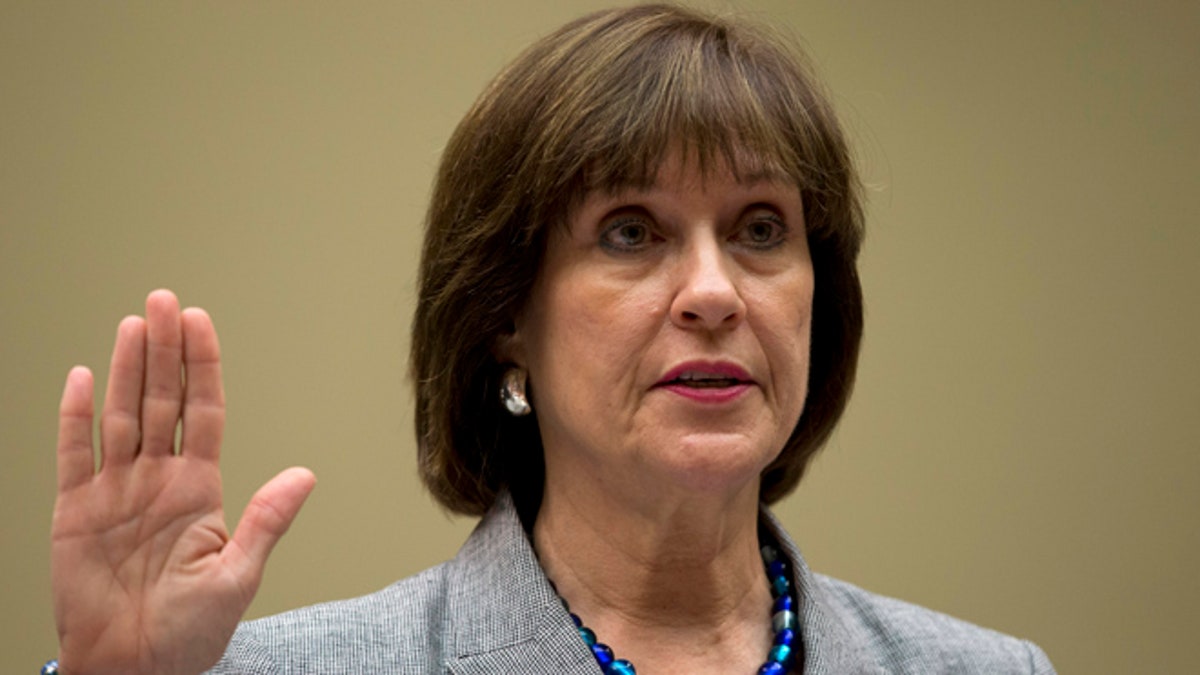
File: May 22, 2013: Ex-IRS official Lois Lerner is sworn in on Capitol Hill, in Washington, D.C. (AP)
Embattled IRS official Lois Lerner appeared to be deeply involved in scrutinizing the applications of Tea Party groups for tax-exempt status, according to newly released emails that further challenge the claim the targeting was the work of rogue Ohio-based employees.
One curious February 2011 email from Lerner said, "Tea Party Matter very dangerous" -- before going on to warn that the "matter" could be used to go to court to test campaign spending limits.
Much of the email, released along with others by the House Ways and Means Committee, is redacted, so the full context is not clear.
But the same email warned that "Cincy" -- presumably a reference to the Cincinnati IRS office -- should "probably NOT have these cases." That and other emails show Lerner and other Washington, D.C., officials playing a big role in dealing with Tea Party cases.
The emails could raise more questions for Lerner, who refused to testify before Congress earlier this year in the Tea Party targeting scandal. While the case seemed to hit the backburner as Congress went on recess, and then returned to take up the debate over Syria, investigations are still ongoing.
House Ways and Means Committee Chairman Dave Camp, R-Mich., said there are "mountains of documents to go through."
"There is increasing and overwhelming evidence that Lois Lerner and high-level IRS employees in Washington were abusing their power to prevent conservative groups from organizing and carrying out their missions," he said in a statement. "It is clear the IRS is out of control and there will be consequences."
The emails show several D.C. officials involved in the screening process, despite early claims after the scandal broke that the Cincinnati office was to blame.
Another February 2011 email from IRS official Holly Paz said "no decisions are going out of Cincy" until the D.C. office goes through the process. Lerner wrote back giving further guidance.
More than a year later, Lerner was alerted via email that the inspector general's office was looking into how they were dealing with applications for tax-exempt status, and that they were taking a "skeptical tone."
"It is what it is," Lerner wrote back, while claiming that management tried to "change the process" and "better educate our staff" to get applications moving.
"We will get dinged, but we took steps before the 'dinging' to make things better," she wrote.
Another email from July 2012 also raises questions about Lerner's political leanings. After being forwarded an article about Democrats claiming anonymous donors were financing attack ads against them, Lerner wrote: "Perhaps the (Federal Election Commission) will save the day."
IRS officials, though, have said the screening program was not politically motivated. The inspector general's office has said it has no evidence to support such claims either.
The IRS said in a statement this week that while it cannot comment on "individual employee matters," newly appointed Acting Commissioner Danny Werfel "made a commitment to transparency and getting the facts out to Congress as well as fixing the underlying mismanagement in the IRS tax-exempt area."
The statement said the IRS is cooperating with Congress while taking "corrective actions," and supports a "complete review of these documents."
Lerner was put on administrative leave after the inspector general's office issued a scathing report claiming the IRS had subjected conservative groups to additional scrutiny as they applied for tax-exempt status. Lerner got ahead of the report's release and confirmed the practice during a Washington event.
While Congress investigates, Tea Party groups are still registering complaints. A Washington Times report said more than 50 applications were still pending or had been pulled as of July.




